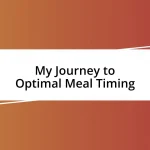Key takeaways:
- Nutrient timing significantly enhances performance and recovery by strategically planning meal intake before and after workouts.
- Adjusting daily nutrition based on activity levels leads to improved energy, mood stability, and overall well-being.
- Overcoming challenges like meal prep and consistency can be addressed with planning, reminders, and communication with others.
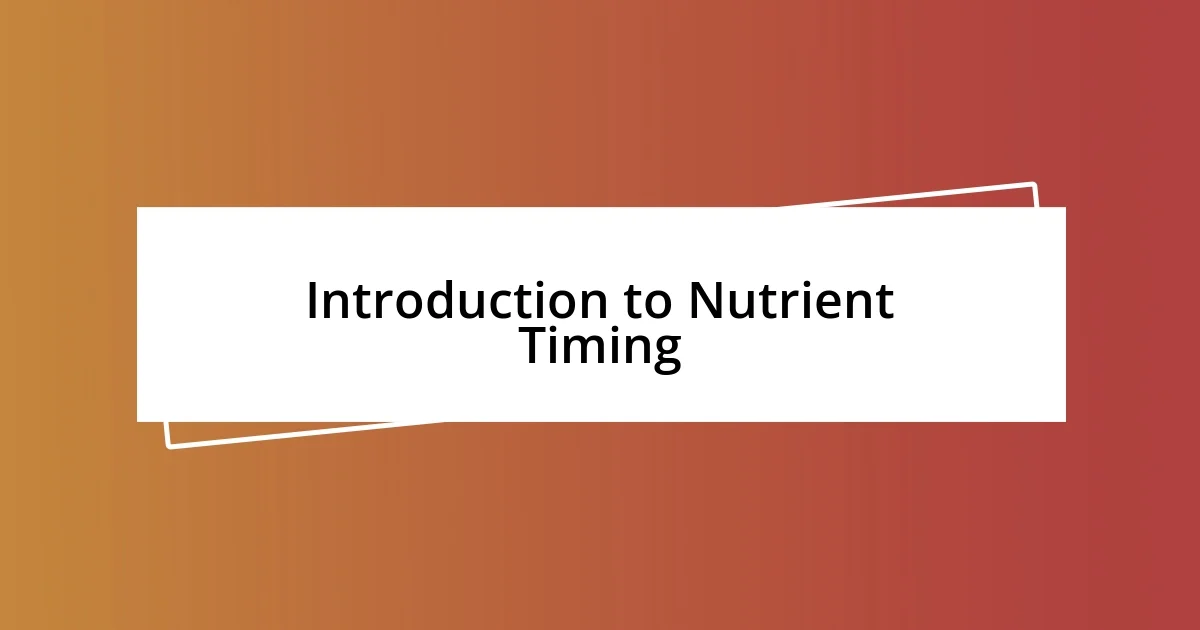
Introduction to Nutrient Timing
Nutrient timing is a concept that revolves around the strategic timing of food intake, particularly around workouts, to maximize performance and recovery. I vividly remember experimenting with meal timing when I trained for my first half-marathon. It was a game-changer for my energy levels during those long runs.
Have you ever noticed how certain foods make you feel energized or sluggish? I certainly have. After realizing that my pre-workout meals directly impacted my performance, I began to dissect the timing of my carbohydrates and proteins. It’s fascinating how feeding your body at the right moments can lead to remarkable improvements.
It’s not just about when you eat; it’s about understanding the unique demands your body faces at different times. I learned this firsthand after making adjustments to my post-workout nutrition, which led to less soreness and faster recovery. Isn’t it incredible how something as simple as meal timing can unlock your body’s potential?
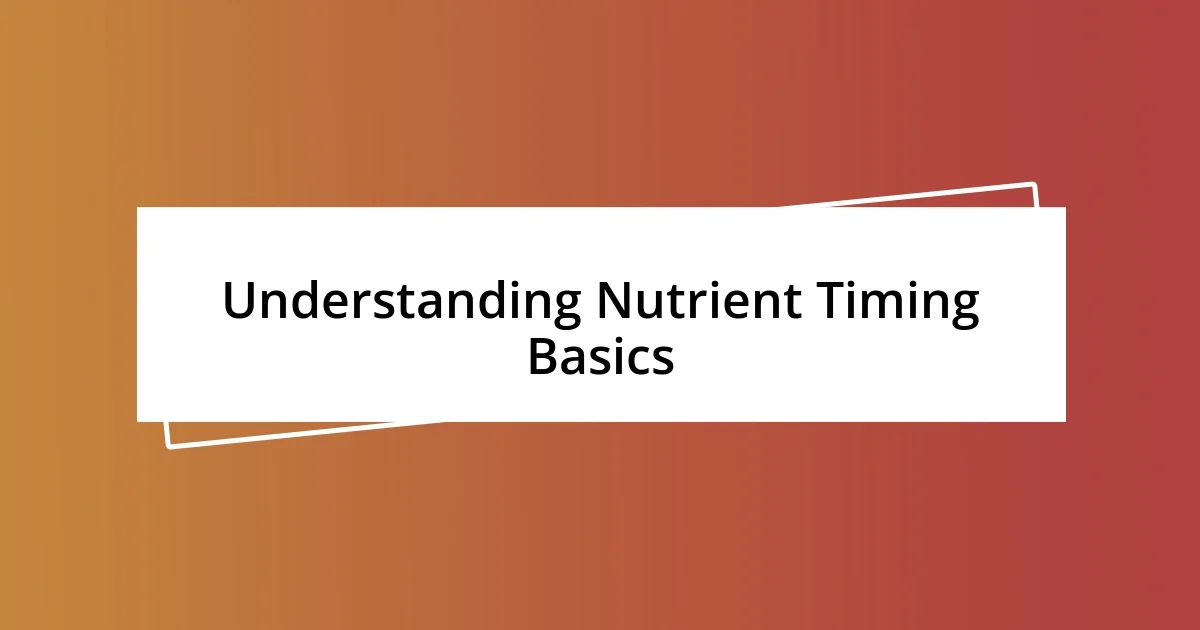
Understanding Nutrient Timing Basics
Understanding nutrient timing has truly transformed my perspective on nutrition and performance. It isn’t just a routine; it’s about listening to your body’s needs at specific moments. I remember feeling sluggish during workouts when I didn’t pay attention to when I ate. One day, I decided to incorporate a small, balanced snack an hour before my evening training session. The difference was astounding—I felt energized and focused, which reminded me how crucial it is to align our food intake with our activity levels.
Here’s a brief overview of the basics of nutrient timing:
- Pre-Workout Nutrition: Consuming carbohydrates and some protein before exercise can boost energy levels and enhance performance.
- Post-Workout Window: Eating protein and carbs shortly after exercising helps with recovery and muscle repair, something I learned the hard way after a particularly grueling training session.
- Daily Nutrition Strategy: Planning meals around exercise phases—like fueling before and refueling afterward—creates an effective rhythm that I wish I had discovered sooner.
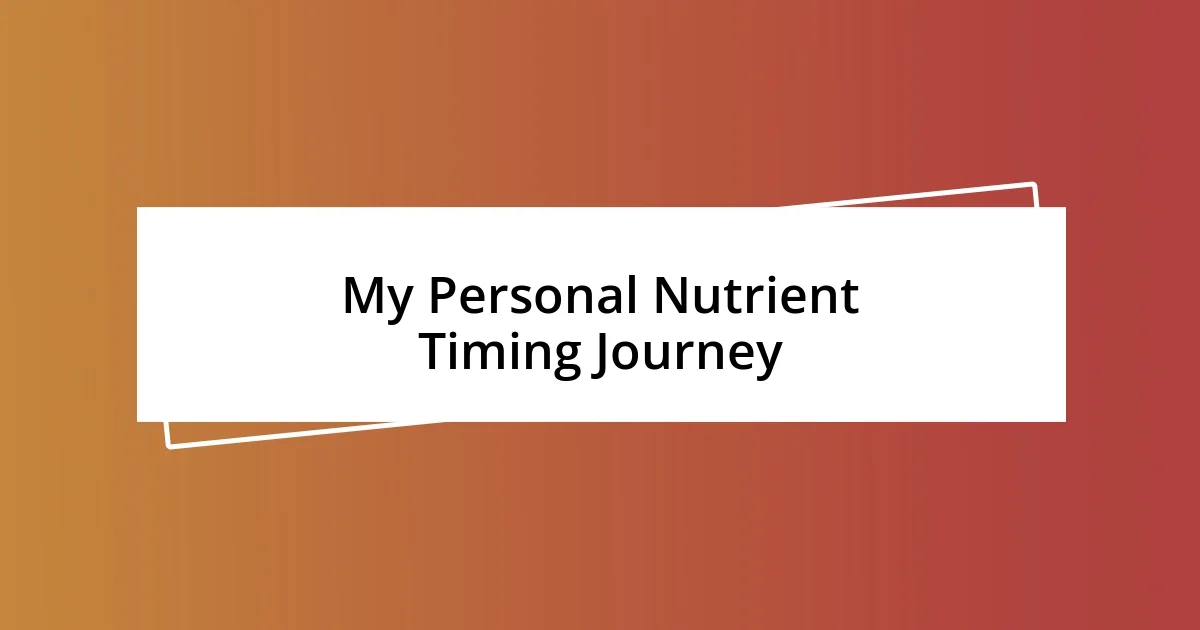
My Personal Nutrient Timing Journey
Nutrient timing has truly been a journey for me, filled with experimentation and learning. I distinctly recall a training cycle where I paid attention to my meal schedule. Before a tough workout, I would indulge in a banana and some nut butter. The immediate rush of energy felt electrifying, propelling me through challenging intervals. It’s amazing how a few minutes spent making mindful choices can set the tone for an entire session.
As I delved deeper into this concept, I discovered the importance of the recovery phase. I vividly remember wrapping up an intense weightlifting routine only to realize I hadn’t eaten anything afterward. The next day, I was met with muscle soreness that made simple tasks feel daunting. After this experience, I committed to post-workout smoothies packed with protein and fruits. The shift in my recovery times was like night and day, and I found myself bouncing back more quickly than ever.
I think one of the most profound lessons I learned was about the role of daily nutrition strategies, particularly aligning my meals with different activity levels. When I strategically planned a hearty breakfast on long run days compared to lighter meals on rest days, my overall energy levels improved. Have you ever felt the difference in your performance based on your meal prep? I can confidently say that this intentional approach turned my workouts into enjoyable endeavors rather than exhausting chores.
| Nutrient Timing Aspect | My Experience |
|---|---|
| Pre-Workout Nutrition | Used bananas with nut butter; energized me significantly. |
| Post-Workout Nutrition | Transitioned to smoothies; recovery improved vastly. |
| Daily Nutrition Strategy | Adjusted meals based on activity—enhanced energy and performance. |

Key Benefits I Noticed
Nutrient timing introduced a noticeable shift in my overall energy levels throughout the day. I remember one particular afternoon when I had a big project deadline looming, and I opted for a balanced meal instead of my usual snack. The sustained energy I felt made a world of difference, allowing me to focus deeply without those annoying mid-afternoon slumps. Have you ever experienced that exhilarating flow state while working, fueled by the right foods at the right time?
I also saw remarkable improvements in my sleep quality post-implementation. On days when I consumed my last meal close to bedtime, I would often toss and turn, feeling restless. However, making it a habit to finish eating a few hours before hitting the hay allowed my body to wind down properly. Waking up refreshed instead of groggy was a game-changer that positively impacted my training sessions the next day.
Finally, let’s talk about mood stability. A well-planned meal schedule kept my energy levels steady, which, in turn, lifted my overall mood. I recall a day when I unintentionally skipped lunch, and it felt as if my whole day was thrown off balance. The crankiness and irritability that followed taught me that nutrition plays a bigger role than we often realize. It’s fascinating how something as simple as timing our meals can influence not just our physical performance but our mental well-being too.
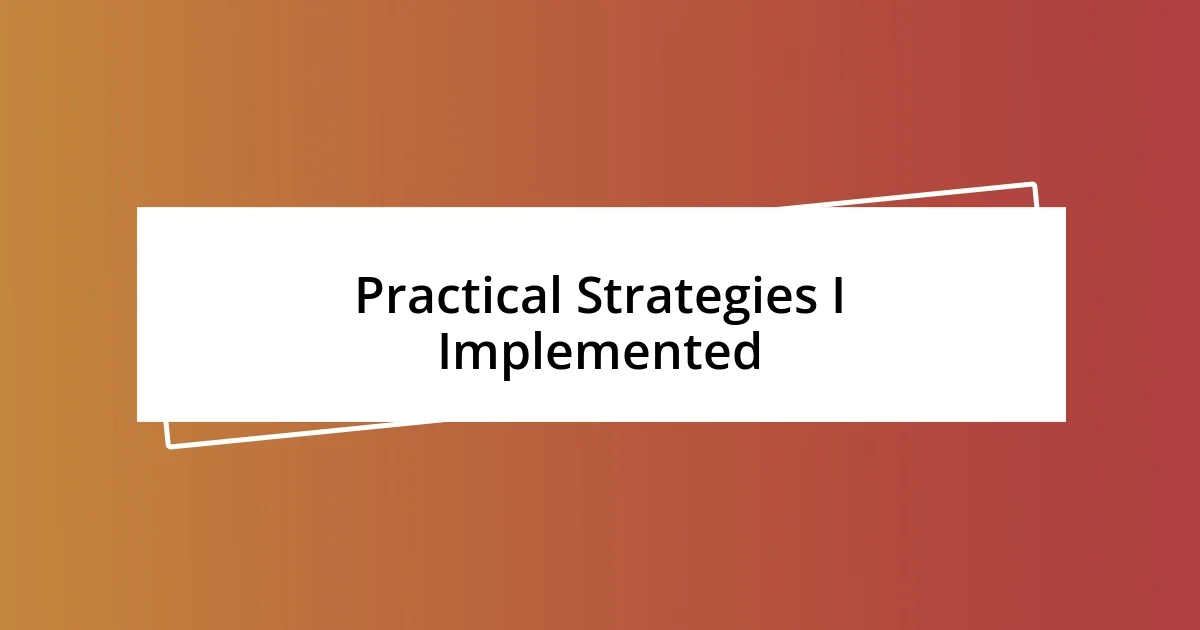
Practical Strategies I Implemented
When I started focusing on nutrient timing, one strategy that really stood out was planning my pre-workout meals. I vividly remember an instance where I had a hefty bowl of oatmeal with fruit. Just thirty minutes later, as I was smashing through my routine, I felt this unprecedented energy driving me forward. The difference was like flipping a switch. Have you experienced that rush where you just knew you fueled your body right before hitting the gym?
Another adjustment I made was minimizing my meals right before my evening workouts. I noticed that eating a full meal too close to my training sessions led to discomfort rather than performance. Instead, I leaned towards lighter snacks, like a small yogurt or a handful of nuts, which kept my energy up without weighing me down. It was almost a revelation how slight tweaks in timing transformed the quality of my workouts. Have you considered the impact of what and when you eat before exercising?
Lastly, embracing the post-workout nutrition strategy has been crucial for my recovery. I remember one night, feeling utterly drained after an intense gym session but neglecting my protein shake. The next day, I woke up sluggish and sore, questioning my commitment. This urged me to prioritize a proper post-workout meal. Now, I paddle straight for a protein-packed smoothie blended with spinach and bananas, which really helps me feel rejuvenated. It’s incredible how nourishing your body after exertion can change the game, isn’t it?

Common Challenges and Solutions
One major challenge I faced with nutrient timing was the overwhelming shift in my routine. At first, juggling meal prep around my busy schedule felt like a part-time job. Have you ever tried to adhere to a strict nutritional plan while life pulls you in a thousand directions? I discovered that setting specific times for meal prep helped to alleviate that stress. Dedicating just a couple of hours on the weekend made my weekdays much smoother.
Another hurdle was occasionally forgetting to eat in the required time windows, especially during hectic days. I’ll never forget the day I was so engrossed in back-to-back meetings that I totally skipped my pre-lunch snack. That was not a fun afternoon! I began using reminders on my phone as little nudges, which transformed my approach. Finding simple solutions like this made a tangible difference and reinforced that I could still succeed despite my chaotic schedule.
Lastly, staying consistent proved to be a challenge, particularly when dining out with friends. It’s tough to stick to your game plan when the allure of spontaneous pizza night calls! I learned that communicating my nutritional goals to my friends led to better support. Plus, choosing restaurants that offer healthier options became a nifty trick. It’s these small adjustments that built a path to success, enabling me to navigate social situations without completely derailing my plan. Have you experienced similar situations socially, and how did you handle them?

Conclusion and Final Thoughts
Reflecting on my journey with nutrient timing, I realize how it’s not just about what you eat but when you eat it. There were days when I felt like a science experiment, meticulously timing my meals around workouts, but ultimately, it became a natural rhythm for me. Have you ever noticed how a simple adjustment can spark a whole new level of motivation?
I still recall the excitement of seeing real progress in my performance. There’s something empowering about fine-tuning your nutrition to support your physical efforts. I often wonder if others feel the same thrill when they discover what works for their bodies. It’s a beautiful blend of science and personal insight, guiding you to craft your optimal routine.
In the end, the ups and downs of my nutrient timing experience taught me that flexibility is key. Life happens—sometimes a planned meal gets skipped, or I find myself craving something indulgent. I’ve learned to adapt and not be too hard on myself when that occurs. Have you found your groove in balancing your nutritional goals with the spontaneous nature of life? When we embrace that balance, we can truly nourish not just our bodies, but our spirits too.














